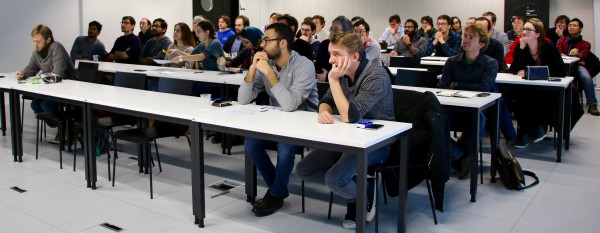MARVEL Junior Seminar — April 2019
The MARVEL Junior Seminars aim to intensify interactions between the MARVEL Junior scientists belonging to different research groups located at EPFL. The EPFL community interested in MARVEL research topics is very welcome to attend. We believe that these events will be central for establishing a vibrant community.
Each seminar consists of two presentations of 25 minutes each, allowing to present on a scientific question in depth, followed by time for discussion. The discussion is facilitated and timed by the chair.
Pizza is served at 11:45 in the MED hall (floor 0), and after the seminar at 13:30 you are cordially invited for coffee and dessert to continue discussion with the speakers.

MARVEL Junior Seminar Organizing Committee — Francesco Ambrosio, Davide Campi, Edgar Engel, Gloria Capano, Michele Pizzochero, Kun-Han Lin, Francesco Maresca and Patrick Mayor
Abstract — A look into the ordering at the Ga/GaAs interface with a machine learning potential
Giulio Imbalzano1, Sébastien Bienvenue1, Mahdi Zamani2, Anna Fontcuberta i Morral2, Michele Cerrioti1
1 Laboratory of Computational Science and Modeling (COSMO), EPFL
2 Laboratory of Semiconductor Materials (LMSC), EPFL
GaAs nanowires grown through the vapor-liquid-solid method exhibit complex behavior at the solid-liquid interface. Ga-terminated surfaces grow as the thermodynamically favorable phase Zincblende. As-terminated surfaces form alternating layers of Zincblende and Wurtzite. Currently, most models focus on the wetting of the liquid droplet to explain the different behaviour, but novel experiments have shown that the interface might also play an important role in this phenomenon. Atomistic models would definitely help in rationalizing the growth of these phases in the bulk, but the length-scale and size of these systems are beyond those accessible to ab initio molecular dynamics (AIMD). In order to overcome these limits, we have generated a machine learning potential (MLP) trained on ab initio data to explore the dynamics at the interface over much longer timescales. The generation of the training data has been carried out mixing AIMD and MLP through the multiple time stepping method, which also allows on-the-fly testing of the accuracy of the MLP.
Abstract — Nonempricial hybrid functionals constructed through adjustable potential probes for band gap predictions of extended systems
Thomas Bischoff, Igor Reshetnyak and Alfredo Pasquarello
Chair of Atomic Scale Simulation (CSEA), EPFL
We describe a nonempirical procedure for achieving accurate band gaps of extended systems through the insertion of suitably defined potential probes. By enforcing Koopmans' condition on the resulting localized electronic states, we determine the optimal fraction of Fock exchange to be used in the adopted hybrid functional. As potential probes, we consider native defects, the extrinsic hydrogen impurity, and various adjustable potentials that allow us to vary the energy level of the localized state in the band gap and its degree of localization. By monitoring the delocalized screening charge, we achieve a measure of the hybridization with the band states, which can be used to improve the band gap estimate. Application of this methodology to AlP, C and MgO yields band gaps differing by less than 0.2 eV from experiment.
Check the list of the next MARVEL Junior Seminars here.
Low-volume newsletters, targeted to the scientific and industrial communities.
Subscribe to our newsletter